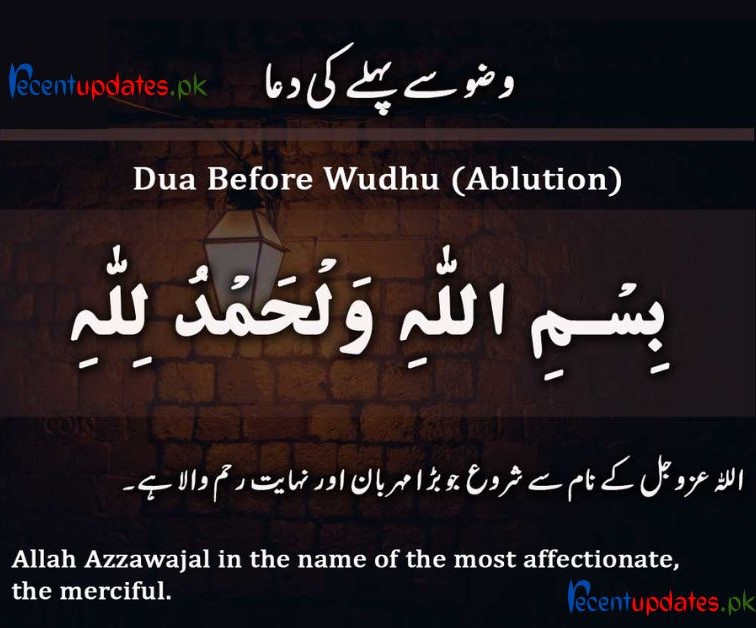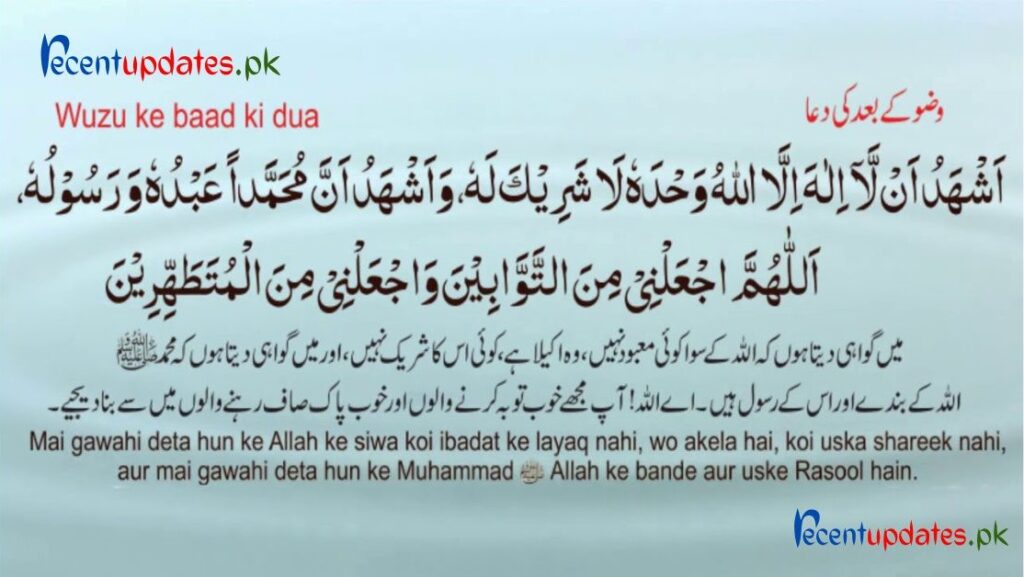When doing Wazu (also called Wudu) for spiritual practice, it’s important to say specific prayers at different times—before, during, and after cleansing. These prayers, known as Wazu Ki Dua, are crucial in Islam for seeking Allah’s blessings, forgiveness, and purification. In this exploration, we’ll look into the details of Wazu Ki Dua, understanding its meaning in Arabic, Urdu, and English.
Key Points
Wazu ki Duaen
In Islam, the practice of Wazu (Wudu) is a sacred ritual involving the physical purification of the body before engaging in acts of worship like we have to perform Wazu before touching Holy Quran, brfore reciting any Duas like nazar e bad, sir dard, bukhar ki dua or any hajat ki dua. Wazu is also important for reciting any namaz(5 times a day namaz, Jummah Namaz, Tahajjud Namaz). Central to this ritual are specific prayers called Wazu ki Duaen, recited at distinct stages—before, during, and after Wazu. These prayers hold deep spiritual significance, serving as a way to seek Allah’s blessings, forgiveness, and purification. Let’s explore the prayers associated with each stage of Wazu.
Wazu se Pehle ki Dua
The Wazu journey starts with a strong prayer, setting the mood for the spiritual cleansing ahead. The prayer before Wazu is a deep recognition of Allah’s name and a expression of gratitude.
Wazu karne se Pehle ki Dua In Arabic:
بِسْمِ اللهِ وَالْحَمْدُ لِلّٰهِ
Bismillahi Walhamdulillah
Wazu Se Pehle Ki Dua In Urdu Hindi:
Allah ke naam se shuru karta hu aur tamam tareefain Allah ke liye hain.
Dua Before Ablution Transliteration:
In the name of Allah, and all praise is for Allah.
This simple yet profound prayer serves as a reminder of the sacredness of the upcoming act, instilling a sense of mindfulness and devotion.

Wazu Se Pehle Ki Dua Ki Fazilat Aur Benefit
Initiating the act of Wudu with the pre-Wudu dua holds immense virtue and benefits in Islam. The recitation of Bismillahi Walhamdulillah aligns the believer’s intentions with the divine, fostering a mindful and devoted state. This dua symbolizes a commitment to purity of intent, gratitude, and continuous dependence on Allah. It serves as a bridge between the physical and spiritual dimensions, elevating Wudu from a routine ritual to a spiritually enriching experience.
Wazu ke Darmiyan ki Dua
During the process of Wazu, it is recommended to recite a specific dua, asking for forgiveness, blessings, and prosperity. Saying this dua with sincerity enhances the spiritual experience of Wazu.
Wazu Karne Ke Darmiyan Ki Dua In Arabic:
اللَّهُمَّ اغْفِرْ لِي ذَنْبِي، وَوَسِّعْ لِي فِي دَارِي، وَبَارِكْ لِي فِي رِزْقِي
Allahummagh Firli Zambi, Wa Wassay Li Fi Daari, Wa Baarik Li Fi Rizqi
Wazu Ke Darmiyan Ki Dua In Urdu/Hindi:
Aay Allah! Mere gunah muaaf farma, mere ghar ko wasee farma, aur mere rizq main barakat ata farma.
Dua To Read During Wadu:
O Allah! Forgive my sins, widen my home, and give blessings in my provisions.
This dua not only seeks spiritual purification but also extends the plea for a broader and more blessed life. It reflects the holistic nature of Wazu, incorporating both physical and metaphysical dimensions.

Wazu Ke Darmiyan Ki Dua Ki Fazilat Aur Benefit
The dua during Wudu carries distinctive virtues and benefits that contribute to the overall spiritual experience. Acting as a continuous remembrance of Allah, this dua fosters mindfulness throughout the stages of purification. By engaging in a more deliberate and intentional Wudu process, believers find a deeper connection with the divine. The recitation symbolizes not just physical cleanliness but a simultaneous commitment to spiritual purity, reflecting the Sunnah of Prophet Muhammad ﷺ.
Wazu ke Baad ki Dua
Finishing the Wazu ritual involves a dua where the believer expresses their testimony of faith and a sincere desire for ongoing repentance and purification.
Wazu Karne Ke Baad Ki Dua In Arabic:
أَشْهَدُ أَنْ لَا إِلَهَ إِلَّا اللَّهُ وَحْدَهُ لَا شَرِيكَ لَهُ، وَأَشْهَدُ أَنَّ مُحَمَّدًا عَبْدُهُ وَرَسُولُهُ
اللَّهُمَّ اجْعَلْنِي مِنَ التَّوَّابِينَ، وَاجْعَلْنِي مِنَ المُتَطَهِّرِينَ
Asshhadu Alla Ilaaha Ilallahu Wahdahu La Shareeka Lahu Wa Asshhadu Anna Muhammadan Abduhu Wa Rasooluh. Allahumma Ja’alni Minat Tawwabin, Waj’alni Minal Muta Tawh’hireen
Dua To Read After Wadu:
Main gawahi deta hu ke Allah ke siwa koi Ibadat ke laiq nahi, Jo akela hai aur uska koi shareek nahi. Aur main gawahi deta hu ke Muhammad ﷺ Allah ke banday aur Rasool hain. Aay Allah mujhe bohat ziada tauba karne walo main se bana aur mujhe apne ap ko paak rakhne walo main se bana.
Wazu Ke Bad Ki Dua In Urdu/Hindi:
I testify that none has the right to be worshipped but Allah Alone, with no partners. And I testify that Muhammad is His servant and Messenger. O Allah! Make me among the repentant, and make me among those who purify themselves.
This comprehensive dua encapsulates the believer’s faith, repentance, and commitment to spiritual purity, making it a fitting conclusion to the Wazu ritual.

Wazu Ke Baad Ki Dua Ki Fazilat Aur Benefits
Concluding the Wudu ritual with a specific dua offers sustained spiritual benefits. The post-Wudu dua becomes a moment of personal reflection and connection with Allah, fostering inner tranquility. The testimony of faith within the dua adds strength to the believer’s conviction, affirming Allah’s oneness and Prophet Muhammad ﷺ as His messenger. Seeking forgiveness and expressing repentance in this dua opens the doors to divine blessings, turning Wudu into a continuous pursuit of Allah’s mercy and favor.
Important Video on Wazu Ki Dua
Summary
In the fabric of Islamic rituals, Wazu stands out as a sacred thread that combines physical purification with spiritual devotion. The recitation of specific duas at various stages enhances the significance of this ritual, turning it into a complete experience. Wazu Ki Dua is more than just words; it’s a profound connection with the divine, a moment of seeking forgiveness, and an affirmation of faith.
As believers perform Wazu, these duas act as a bridge between the material and the spiritual, adding profound meaning to the experience. Each prayer, whether said before, during, or after Wazu, contributes layers of depth to the act, creating a harmonious blend of physical cleanliness and spiritual elevation.
Amid the noise of daily life, Wazu and its accompanying duas serve as a sanctuary—a moment of introspection, repentance, and renewal. The repetition of these prayers becomes a rhythm, guiding believers through the symphony of their spiritual journey.




